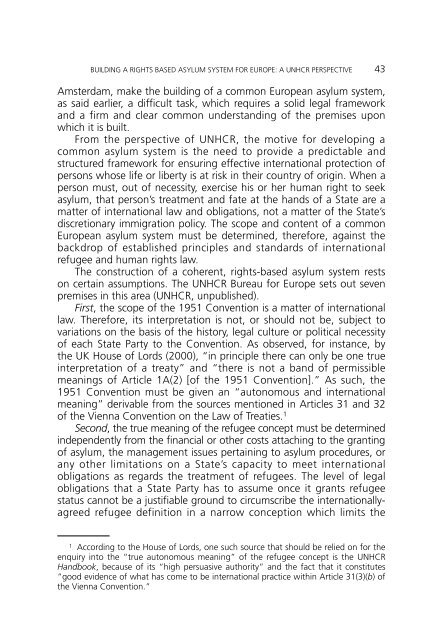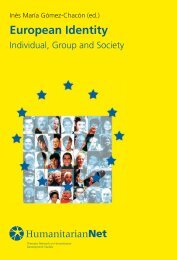Immigration in Europe - HumanitarianNet - Universidad de Deusto
Immigration in Europe - HumanitarianNet - Universidad de Deusto
Immigration in Europe - HumanitarianNet - Universidad de Deusto
Create successful ePaper yourself
Turn your PDF publications into a flip-book with our unique Google optimized e-Paper software.
BUILDING A RIGHTS BASED ASYLUM SYSTEM FOR EUROPE: A UNHCR PERSPECTIVE 43Amsterdam, make the build<strong>in</strong>g of a common <strong>Europe</strong>an asylum system,as said earlier, a difficult task, which requires a solid legal frameworkand a firm and clear common un<strong>de</strong>rstand<strong>in</strong>g of the premises uponwhich it is built.From the perspective of UNHCR, the motive for <strong>de</strong>velop<strong>in</strong>g acommon asylum system is the need to provi<strong>de</strong> a predictable andstructured framework for ensur<strong>in</strong>g effective <strong>in</strong>ternational protection ofpersons whose life or liberty is at risk <strong>in</strong> their country of orig<strong>in</strong>. When aperson must, out of necessity, exercise his or her human right to seekasylum, that person’s treatment and fate at the hands of a State are amatter of <strong>in</strong>ternational law and obligations, not a matter of the State’sdiscretionary immigration policy. The scope and content of a common<strong>Europe</strong>an asylum system must be <strong>de</strong>term<strong>in</strong>ed, therefore, aga<strong>in</strong>st thebackdrop of established pr<strong>in</strong>ciples and standards of <strong>in</strong>ternationalrefugee and human rights law.The construction of a coherent, rights-based asylum system restson certa<strong>in</strong> assumptions. The UNHCR Bureau for <strong>Europe</strong> sets out sevenpremises <strong>in</strong> this area (UNHCR, unpublished).First, the scope of the 1951 Convention is a matter of <strong>in</strong>ternationallaw. Therefore, its <strong>in</strong>terpretation is not, or should not be, subject tovariations on the basis of the history, legal culture or political necessityof each State Party to the Convention. As observed, for <strong>in</strong>stance, bythe UK House of Lords (2000), “<strong>in</strong> pr<strong>in</strong>ciple there can only be one true<strong>in</strong>terpretation of a treaty” and “there is not a band of permissiblemean<strong>in</strong>gs of Article 1A(2) [of the 1951 Convention].” As such, the1951 Convention must be given an “autonomous and <strong>in</strong>ternationalmean<strong>in</strong>g” <strong>de</strong>rivable from the sources mentioned <strong>in</strong> Articles 31 and 32of the Vienna Convention on the Law of Treaties. 1Second, the true mean<strong>in</strong>g of the refugee concept must be <strong>de</strong>term<strong>in</strong>ed<strong>in</strong><strong>de</strong>pen<strong>de</strong>ntly from the f<strong>in</strong>ancial or other costs attach<strong>in</strong>g to the grant<strong>in</strong>gof asylum, the management issues perta<strong>in</strong><strong>in</strong>g to asylum procedures, orany other limitations on a State’s capacity to meet <strong>in</strong>ternationalobligations as regards the treatment of refugees. The level of legalobligations that a State Party has to assume once it grants refugeestatus cannot be a justifiable ground to circumscribe the <strong>in</strong>ternationallyagreedrefugee <strong>de</strong>f<strong>in</strong>ition <strong>in</strong> a narrow conception which limits the1 Accord<strong>in</strong>g to the House of Lords, one such source that should be relied on for theenquiry <strong>in</strong>to the “true autonomous mean<strong>in</strong>g” of the refugee concept is the UNHCRHandbook, because of its “high persuasive authority” and the fact that it constitutes“good evi<strong>de</strong>nce of what has come to be <strong>in</strong>ternational practice with<strong>in</strong> Article 31(3)(b) ofthe Vienna Convention.”
















